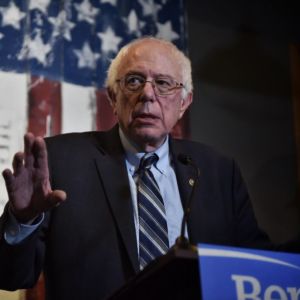Sen. Bernie Sanders, I-Vt., alongside other progressive lawmakers, introduced a bill Thursday aimed at increasing the federal minimum wage to $15 an hour.
Sanders has been a leading voice in pushing for the $15 minimum wage. He was joined by others on the left including Senate Minority Leader Chuck Schumer and House Minority Leader Nancy Pelosi when introducing the proposal. The bill is written to gradually increase the federal minimum wage to $15 an hour by 2024.
“I think most people are aware that for the last 40 years the middle class of our country has been in decline,” Sanders said while introducing the legislation. “In Vermont and all throughout this country we have people working two to three jobs, we have people working 50, 60, and 70 hours a week just to put food on the table, just to make sure their families can live with a modicum of dignity.”
Sanders first hinted his intent to introduce the bill Apr. 7. He posted online, at the time, that the current federal standard was an insult to workers. The federal minimum wage of $7.25 an hour hasn’t been updated since 2009. The bill was originally expected to be unveiled last month.
“The reason for all of that is wages in this country are just too low,” Sanders said. “The time is long overdue for us to raise the minimum wage which is now at the federal level $7.25 an hour, which I think under any definition is a starvation wage. We have to raise the minimum wage to a living wage.”
Sanders helped make the $15 minimum wage a centerpiece of the Democratic presidential primary. He originally introduced the proposal in July 2015 towards the beginning of his presidential run. Some Democrats expressed reservations at first, but by the following year, the idea had gained enough support to be included in the party platform.
New York and California, alongside a list of cities, have already passed the $15 minimum wage. Seattle was followed by other cities when it first passed the increase in June 2014. Labor unions and other progressive advocates helped make the policy a national issue.
The Fight for $15 movement has been at the forefront of the minimum wage debate since it started in November 2012. It has held numerous protests and launched media campaigns in support of the policy. The movement is primarily supported by labor unions like the Service Employees International Union (SEIU).
Supporters of the policy are optimistic it could help people escape from poverty. The increase might also spur economic growth as workers are able to afford basic needs. The Economic Policy Institute (EPI), a progressive nonprofit, found a federal increase would lift wages for 41 million workers without many consequences.
“The federal minimum wage was established in 1938 to help ensure that all work would be fairly rewarded and provide a decent quality of life,” EPI said in a statement when the bill was being introduced. “The current minimum wage falls far short of this goal. Thanks to congressional inaction, the purchasing power of the minimum wage has been eroded by inflation.”
The $15 minimum wage has also attracted plenty of critics who fear it could have severe unintended consequences. Employers might be forced to reduce their staff size or increase prices to overcome the added cost of labor. The National Bureau of Economic Research and The Heritage Foundation found the risk is especially prevalent for young and low-skilled workers.
“Democrats are confirming today that they are now the party of the looney left and will follow in the footsteps of Bernie Sanders and Elizabeth Warren in a march towards extremism and away from the realities of basic economics,” Jeremy Adler, communications director for the conservative nonprofit America Rising Squared, told InsideSources. “This legislation proves that their party’s leadership will embrace a policy that will eliminate millions of jobs, increase costs across the board, and put an unsustainable burden on businesses.”
The Employment Policies Institute, a conservative nonprofit, has been highlighting the potential harms of the proposal in a digital campaign. The campaign features small business owners who were put out of work because of the $15 minimum wage.

